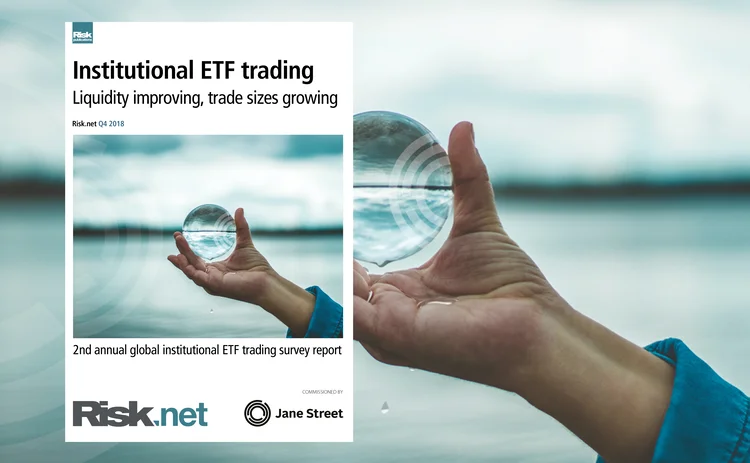
Institutional ETF trading: Liquidity improving, trade sizes growing

Institutional investors have a deep understanding of exchange-traded funds (ETFs) and are becoming ever-more adept at navigating the market to find the best solutions for their needs. They also believe these products are more liquid, or as liquid, as they were three years ago. These are the key findings from Risk.net’s second annual global institutional ETF trading survey, commissioned by Jane Street, which covered 296 institutional investors across Europe, Asia and the Americas.
Buy-side firms are trading ETFs frequently and at scale, with almost one‑quarter of global institutions surveyed reporting that they had executed a trade over $100 million in size. Increased comfort with trading ETFs may be connected to improved perceptions of these products’ liquidity. Ninety-four per cent of survey respondents said developed market ETFs are more liquid than, or about as liquid as, three years ago. The corresponding figures for emerging market and fixed‑income ETFs were 88% and 87% respectively.
Investor awareness of the fundamentals driving ETF liquidity is also on the rise. Buy-side firms are looking beyond top-level indicators, such as funds’ bid-offer spreads or average daily volumes, and are grappling with the liquidity characteristics of the instruments that underpin them. Of global respondents, 31% said they use underlying securities to gauge the liquidity of an ETF, up from 27% in 2017.
As ETFs have established a central position in buy-side firms’ investment strategies and ticket sizes have grown, it makes sense that competitive pricing has risen to the top of institutions’ wish lists when it comes to trading. Asset managers are operating in an environment of low and falling fees, meaning every basis point counts when it comes to cost of asset ownership calculations. This explains why 55% of global survey respondents said competitive pricing most influences their choice of ETF trading counterparty.
And these firms’ top choice of partner? Independent ETF market‑makers – which investors favour for their ability to execute trades in complex and thinly traded markets at competitive prices. Thirty-five per cent of respondents said they work with these firms most frequently, up from 29% in 2017, and more than those who favoured investment banks, which claimed 31% of investors.
In contrast, just 23% said they use agency brokers most often, down from 34% a year ago. This change appears to be driven in part by a change in preference by European respondents, in response to the implementation of the revised Markets in Financial Instruments Directive.
There is another reason independent market-makers have gained ground this year – their ability to provide risk pricing for large ETF trades. Globally, 47% of respondents said they use risk pricing most often because it offers investors immediate execution at a transparent and fixed price, taking away the uncertainty associated with net asset value pricing or trading on-exchange using algorithms.
Investors understand that trading ETF blocks using risk pricing often represents the best means of execution, especially when a series of counterparties are put in direct competition with one another. This can be achieved most effectively via a request-for-quote (RFQ) process, which are popularly facilitated on electronic platforms. These offer institutions quick access to a number of selected liquidity providers, which can then screen quotes for block trades in real time – minimising the risk of information leakage, which can cause spreads to move against an investor.
The survey found that 38% of respondents use these platforms most often to submit block trade orders, up from 32% in 2017. Unsurprisingly, respondents that prioritised price competitiveness were more likely to prefer RFQ platforms as their execution mechanism than those that prioritised other factors.
Institutions are developing a more granular understanding of ETF liquidity and pricing, and an awareness of which counterparties are best suited to execute trades most efficiently. This has led many to seek out independent market-makers and put them in competition through RFQ platforms. The end-result has invariably been tighter pricing and greater assurance that best execution has been achieved.
Read/download the Institutional ETF trading survey report
Sponsored content
Copyright Infopro Digital Limited. All rights reserved.
You may share this content using our article tools. Printing this content is for the sole use of the Authorised User (named subscriber), as outlined in our terms and conditions - https://www.infopro-insight.com/terms-conditions/insight-subscriptions/
If you would like to purchase additional rights please email info@risk.net
Copyright Infopro Digital Limited. All rights reserved.
You may share this content using our article tools. Copying this content is for the sole use of the Authorised User (named subscriber), as outlined in our terms and conditions - https://www.infopro-insight.com/terms-conditions/insight-subscriptions/
If you would like to purchase additional rights please email info@risk.net